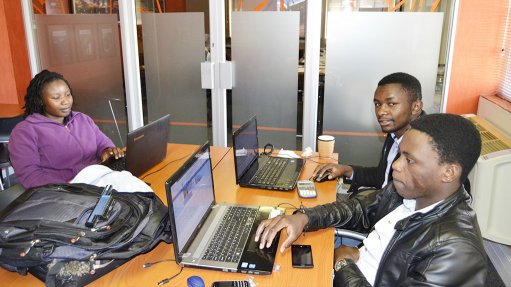
From left: interns from Vaal University of Technology at Saisc offices Mpho Mukhudwani, Lugisani Mavhimbi and Ritshidze Mavhungu
Steel construction companies should use quieter business periods, the result of negative economic conditions, to improve the skills of their workers, says steel construction industry body the Southern African Institute of Steel Construction (Saisc) education director Spencer Erling.
He says one of the problems which stems from being very busy is that there is little time for education and training, to the detriment of a company’s ability to produce the best possible work.
“[Therefore], skills improvement in lean times represents a veritable silver lining in the dark cloud of [limited] work,” Erling says.
He adds that the steel construction industry stands to benefit from the education initiatives that Saisc is implementing. The institute has launched a steel academy that is the umbrella body for all activities that relate to steel.
“Whether it is saving jobs by helping to pro- tect the local industry from imports or promoting employment through education, the academy is here for the development of the steel construction industry and the economy generally.”
One of the successful initiatives from the training and education programme is the Saisc School of Draughting for structural steel detailers.
Students spend six months at the institute under the guidance of Erling and Saisc development engineer Amanuel Gebremeskel to develop and hone their skills. They are also trained in report writing, experimental testing and connection design.
In addition, for their steel-construction- and steel-fabrication-related experience, they spend six months at Saisc member companies Genrec Engineering and Tass Engineering.
“The improvement in confidence, knowledge and speed of work of the students has been dramatic,” says Erling.
Meanwhile, Saisc also runs an initiative where it invites university of technology students who have completed their second-year of formal diploma studies in civil engineering to join internships. This serves as their one-year experiential work and training in the industry.
“Largely because of the current difficult financial times for the greater construction industry, such students are finding it difficult to find jobs for experiential training,” Erling says.
Further, the Department of Science and Technology is also involved in Saisc’s edu-cation and training initiative, says Erling. The department involves itself by paying the salaries of six interns that were currently working at Saisc member companies.
“As most of the management at Saisc are engineers who understand how important those first few years of employment under great mentors were to them, the institute decided to put something back into the industry,” concludes Erling.